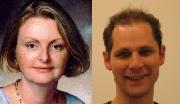
Two Rhodes academics, Prof. Mark de Vos and Dr Sally Hunt, were elected as leaders of southern Africa’s linguists this June. Mark de Vos is the new president of the Linguistics Society of Southern Africa (LSSA), and Sally Hunt is now the chair of the Southern African Applied Linguistics Association (SAALA).
Both Prof. De Vos and Dr Hunt were elected at the AGMs of the two societies at “Language: Synergies and Intersections”, the 2014 joint conference of the LSSA, SAALA and SAALT (South African Association of Language Teachers) at the University of the Witwatersrand from 24 to 27 June.
It is quite an unusual honour that the chairs of both linguistic societies in southern Africa should be based in the same department. Other members of the department also hold positions in the leadership of both societies: Kristin van der Merwe has been elected as SAALA’s new membership secretary and Prof. Ron Simango is a board member of the LSSA.
Prof. De Vos says, “Rhodes has always been a strong supporter of the linguistics societies and of the discipline as a whole. I think it is wonderful that the president and chair of the LSSA and SAALA are both based at Rhodes. This is something of a happy coincidence and I hope that Sally and I will be able to use this opportunity to strengthen both societies and bring them closer together.”
“I look forward to leading and supporting the LSSA as it strives to promote linguistic study and a sensitivity for the beauty of language. In my view, Linguistics remains one of the most relevant disciplines to the challenges facing Southern Africa: whether you are describing and analysing the syntax, phonology or morphology of indigenous languages, mapping dialects and varieties, promoting linguistic understandings of literacy, exploring how people use language in multilingual settings, explaining how media texts affect people’s perceptions of society, politics and citizenship – in fact, just about anything you can think of is mediated by language. And linguistics lies at the heart of that.”
“The societies have a lot in common,”, says Dr Hunt, “including of course the promotion of research in linguistics broadly in South Africa, and it will be great to be able to work together so easily with my counterpart in the LSSA. Having the two leadership roles here also reflects quite nicely our emphasis in the department on maintaining a balance between applied linguistics and the more formal approaches."
